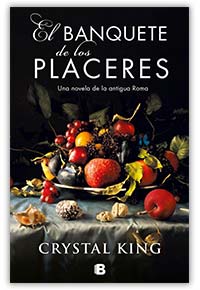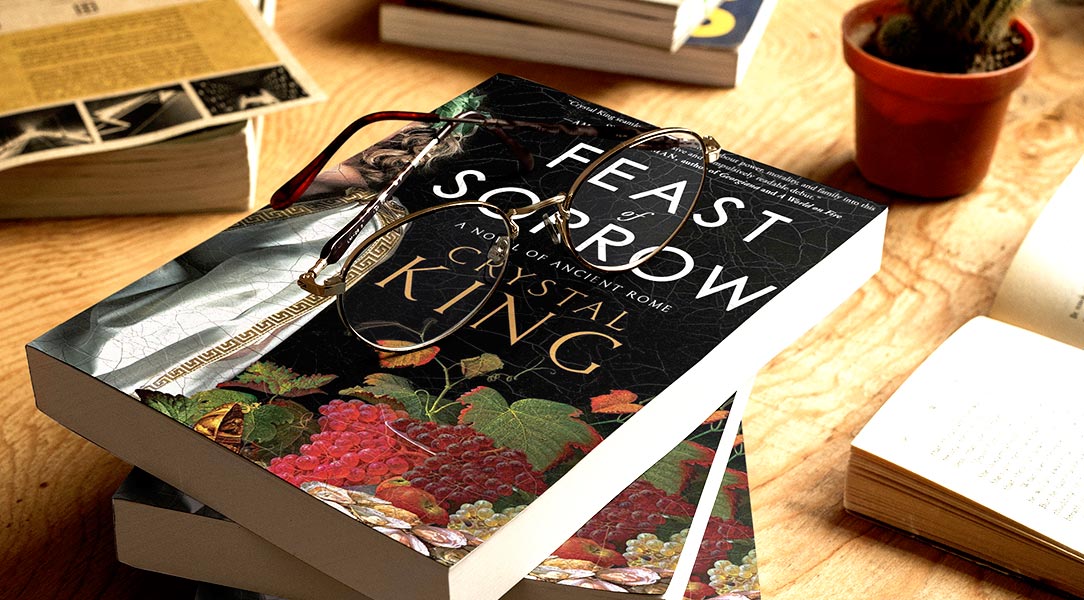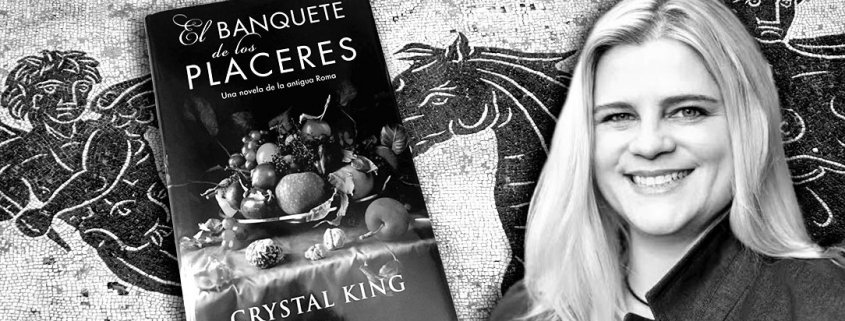Interview with Crystal King, author of «Feast of Sorrow»
Today, we have a very special interview with the writer Crystal King. She has accepted to talk to us about her novel «Feast of sorrow». Thanks Crystal and thanks Eva for helping me in this adventure, dear teacher.
• Why did you decide to write a novel about Ancient Rome´s most famous gourmand?
I was writing a very different novel, about a contemporary celebrity chef with a magical set of knives that had been passed from chef to chef through history. But, I needed an origin story for the knives. At the same time, I was reading a book about the history of banquets and feasts and I came across one line about Apicius, which mentioned how he died. It intrigued me so much that I began to write a scene about Apicius, but I became so interested in his story that I abandoned the other novel to write Feast of Sorrow instead.
• If your novel is about Apicius, why is Thrasius, the slave, the narrator?
I originally began to write the story in Apicius’s point of view but then I realized that would take away much of the tension of his final days and how he died. I did not know how I could tell the story in Apicius’s voice without giving away all the details. Also, Apicius is a difficult and sometimes awful person. Thrasius gives the reader someone to believe in.
 • Has it been hard to find out information about this historical character?
• Has it been hard to find out information about this historical character?
Most of what we know about Apicius is only from small mentions by other people. Pliny writes about him in his Naturalis Historia and other men of the time such as Martial and Seneca also mention Apicius. I was very sad to learn that a book by the grammarian Apion, titled On the Luxury of Apicius, is lost to us. I have a feeling that Apicius was even more glamorous and outrageous than we think. We know very little of his life except for these few moments and that was the fun part of writing the book—I get to make it all up. Fortunately, we know a lot about the world of ancient Rome so while I didn’t know much about Apicius, I was able to discover a lot about the world he lived in, about food during that time and the way that he might have lived.
• Has it been a challenge for you?
I write historical fiction because I love the puzzle of figuring out what might have happened. I think of it very much like the connect-the-dots games of our childhood. I only know some of the history, but that means I can fill in all the gaps. I love doing the research, I love making discoveries that might connect my characters together. So while writing about Apicius has been a challenge in some ways, it’s a good, exciting challenge for me.
• Are you a Good cook? Have you ever tried any of the recipes which appear in your novel?
I think I’m a good cook. My true love is to bake sweet desserts of which there weren’t very many in ancient Rome. My husband is the real chef in the kitchen! Together we have cooked many of the dishes found in the Apicius cookbook. That has been a fun challenge because there aren’t any instructions with the recipes. They are mostly a list of ingredients, which means there is a lot of trial and error in the kitchen.
I also had the great fortune to work with many celebrated chefs and food historians to recreate the recipes. I published a digital cookbook (unfortunately, only in English) with those modern versions of the Apicius recipes. If any reader wants to try some of their own, they can visit my website: http://www.crystalking.com/recipes
• Would you recommend any of these delicious dishes?
Yes! My favorite is Parthian chicken, a recipe so easy that we make it regularly for dinner. I also love Apicius’s honey fritters, fig cake and many of the recipes for duck and lamb. We also make mustard beets for dinner quite often too.
• In your Feast of Sorrow you show loyalty as an essential asset in many of your characters. Was it a common feature in Ancient Rome? I remember Julius Ceasar’s ending and it seems almost impossible, do you agree?
I think that there are always some people in any situation that are loyal, sometimes to a fault. And I think that sometimes people remain alongside terrible people when others cannot truly understand their motives. In the case of Feast of Sorrow, the most loyal to Apicius were slaves who, for much of the book, were dependent upon him. They endure awful things but at the same time, they can see Apicius as he really is. They are like family in many ways and families tend to stick together in unbearable circumstances more often than other groups of people, such as the senators who turned on Julius Caesar.
• You describe a splendorous kitchen and a kind of MasterChef’s school in your story. I’d love to have a similar one! Where and how did you get the inspiration for it?
One of the few things we know about Apicius is that he may have had a cooking school! It’s really only a tiny mention and we know nothing about it. That’s where my imagination can take over. I tried to think about what a cooking school might have been like, and if someone as rich as Apicius was the one who built it.

Portada de la edición original de «El banquete de los placeres», de Crystal King
• How long have you been writing your book Feast of Sorrow?
I began it ten years ago, but it probably only took me 4-5 years to write it, mostly on weekends, off and on. The harder part was finding a literary agent to represent me. That took several years, but when I did, finding a publisher was swift. And then, it was 18 months from the time I signed the contract to the time it was published (plus another year for the Spanish translation). Hopefully future books will be much faster.
• Are you preparing a new novel? Will be it inspired in Ancient Rome or in any classic culture?
My second novel, titled THE SECRET CHEF in English (they often change the titles for different countries), will be published in the US in 2019. It’s about the Renaissance chef, Bartolomeo Scappi, who was the cook to several different Popes in the 1500s. And currently, I’m working on my third novel, which is about a meat carver who worked for Cardinal Alessandro Farnese, set in the same time frame. I’m a bit enamoured with the chefs who inspired so much of Italian cooking.
• What would you tell Spanish readers in order to read your novel?
There are a lot of foods from Ancient Rome that are likely to be familiar to Spanish readers. So much of the food from that time has become staples to the cuisines of other countries. I would tell not just my Spanish readers, but all my readers, to not read Feast of Sorrow on an empty stomach, as reading the story might make them hungry!
• Are you thinking about coming to Spain?
I have never been to Spain but it is a country which I would dearly love to travel to. My husband has been to your country and he tells me how beautiful it is, how kind and generous the people are, and how much I would love the food. Visiting Spain is very high on my wish-list and I hope that someday I can come and meet my readers there!
 Eva María Martín Martín
Eva María Martín Martín Eva María Martín Martín
Eva María Martín Martín

 Eva María Martín Martín
Eva María Martín Martín Eva María Martín Martín
Eva María Martín Martín Eva María Martín Martín
Eva María Martín Martín Eva María Martín Martín
Eva María Martín Martín
A very Good interview Eva!. How did you get it?